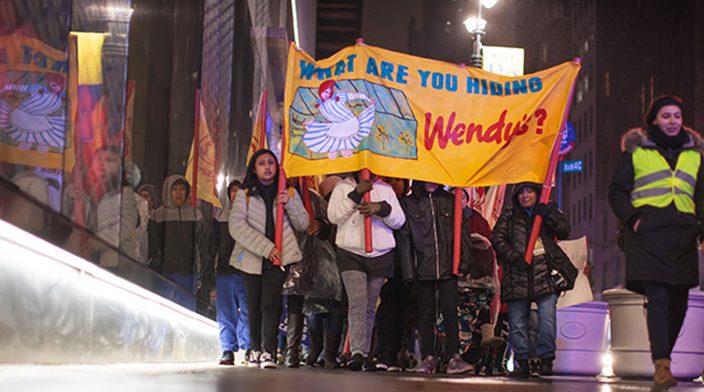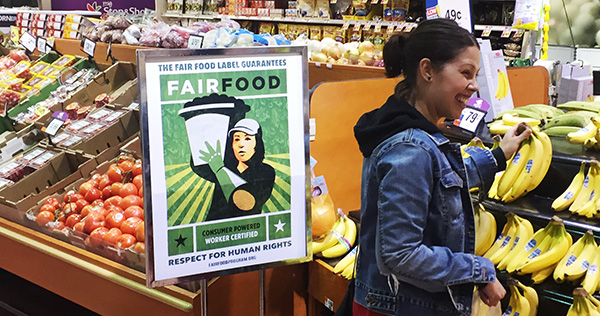
Genevieve LeBaron, author of new book Combatting Modern Slavery: Why Labour Governance Is Failing and What We Can Do About it, pens scathing critique of corporate-led social responsibility efforts for Reuters Foundation in op/ed titled, “It’s time to stop believing corporate fairy tales about modern slavery”;
“Study after study has found that tools like social auditing and ethical certification are profoundly flawed and ineffective when it comes to the worst forms of labour exploitation… Research reveals corporate fairytales for what they are: enthralling stories that are very unlikely to be true.”
This past August we reported on the publication of a landmark, 10-year study of 40 corporate social responsibility initiatives, titled “Not Fit for Purpose: The Grand Experiment of Multi-Stakeholder Initiatives in Corporate Accountability, Human Rights, and Global Governance,” that concluded that the traditional, corporate-led model of social responsibility “should not be relied upon for the protection of human rights” in global supply chains. That study, which compiled research on a wide range of corporate ethical certification schemes — including such well-known social responsibility brands as Fair Trade International, the Rainforest Alliance, and the Ethical Food Initiative — found, in no uncertain terms, that those programs “are not effective tools for holding corporations accountable for abuses, protecting rights holders against human rights violations, or providing survivors and victims with access to remedy.” The same study identified the Worker-driven Social Responsibility (WSR) model, and the CIW’s Fair Food Program specifically, as examples of the new “gold standard” for human rights protection in corporate supply chains, citing the WSR model’s strategic decision to situate workers and communities “at the center of decision-making,” and its harnessing of participating buyers’ market power to enforce human rights standards, as essential to endowing “rights holders” with real power to enforce their own rights.
And now, with the publication of a powerful new book by Genevieve LeBaron, a Professor of Politics and Co-Director of the Sheffield Political Economy Research Institute at the University of Sheffield (UK), it would appear that a growing academic consensus has indeed emerged: The dominant social responsibility paradigm has failed, and the time has come for a concerted expansion of the WSR model to protect workers’ fundamental human rights in corporate supply chains.
In an op/ed published by the Reuters Foundation to mark the release of her new book, Professor LeBaron wastes no time in getting straight to the heart of her thesis. Her op/ed, titled “It’s time to stop believing corporate fairy tales about modern slavery,” begins:
Corporations love to tell fairytales about their efforts to eradicate modern slavery. On panels at the World Economic Forum, rock music festivals, and in glossy corporate social responsibility (CSR) brochures, they tell us about their codes of conduct that can prevent debt bondage in faraway lands and the heroic social auditors they hire to tame unruly factories. They regale us with stories about the criminal perpetrators of human trafficking and slavery contaminating otherwise pristine supply chains, and how their multi-stakeholder initiatives and working groups and partnerships with anti-slavery organizations can swoop in to save the day.
These stories are seductive… We want to believe the happy and compelling stories they tell about bringing decent work and living wages to workers across the global economy are true.
But the evidence suggests they are not. As I argue in my new book Combatting Modern Slavery published today – on World Day against Trafficking in Persons – academic research including my own suggests that CSR is badly failing to detect, address, and prevent forced labour in the global economy. Study after study has found that tools like social auditing and ethical certification are profoundly flawed and ineffective when it comes to the worst forms of labour exploitation… Research reveals corporate fairytales for what they are: enthralling stories that are very unlikely to be true.
And like the MSI Integrity study, Professor LeBaron not only deconstructs the failure of the CSR model to adequately protect human rights, she also identifies a solution for corporations genuinely seeking an effective way forward, the Worker-driven Social Responsibility model, and in the food industry, the Fair Food Program:
… We need to change the commercial conditions that cause forced labour to manifest and thrive in global supply chains in the first place. I provide an overview of these in my book, and explain how measures like value distribution along supply chains, benchmarking labour costs, and worker-driven social responsibility initiatives can address the root causes of forced labour in supply chains. Unlike CSR, these solutions require alterations to the status quo business model, where profits are hoarded at the top of supply chains with almost no money going towards the bottom.
And we need to empower workers to put forward their own solutions. The initiatives in which they have done so – from the Fair Food Program to transnational organizing along supply chains—are amongst the most successful examples we have of contemporary efforts to combat modern slavery. While they may not have the resources to make glossy brochures on corporate websites, workers are fully capable of developing and implementing solutions to prevent and address labour abuse and promote their rights in supply chains.
They know better than anyone why and how severe exploitation arises and how it can be eradicated.
The op/ed is a great read, but be sure to check out Professor LeBaron’s new book, Combatting Modern Slavery: Why Labour Governance Is Failing and What We Can Do About it, for a more thoroughgoing analysis of the human rights crisis in corporate supply chains today, and the urgent need for a smarter, more effective approach to ending forced labor, gender-based exploitation, and extreme poverty for millions of men and women around the globe.
The future of social responsibility is clear…
The growing consensus among academics and human rights experts in support of the WSR model is creating real momentum for the expansion of the Fair Food Program on the ground here closer to home. FFP participating buyers like Whole Foods and Compass Group are — even in these difficult times — proudly embracing their partnership with the workers who harvest the produce they sell to millions of customers every day, and actively encouraging new suppliers to step up to the Fair Food Program’s best-in-class standards and enforcement mechanisms.
With each new consumer who learns about the FFP’s groundbreaking model, and the unparalleled progress achieved by workers under its protections — and with each new grower who joins the FFP, and in so doing expands those protections to new workers in new crops and new states — farmworkers’ lives are made materially better. It’s that simple.

Yet there are still many more companies — food industry giants like Wendy’s, Publix, Kroger, and Costco — that continue to turn their backs on the Fair Food Program and rely instead on the outdated and failed CSR model to allay their customers’ concerns about working conditions in their suppliers’ operations. Rather than recognize the FFP’s ten-year track record of success and help expand its reach, Wendy’s, for example, stands stubbornly behind the idea that its generic code of conduct and sporadic audits are somehow equivalent to a proven program that combines worker-drafted human rights standards, worker-to-worker rights education, a 24/7 complaint investigation and resolution process, deep-dive audits that put the standard audit process to shame, a premium to help improve workers’ income, and market consequences to enforce code violations, in a comprehensive, worker-driven approach to monitoring and enforcing human rights. “Joining the Fair Food Program is simply not the only way to operate a responsible supply chain,” wrote Wendy’s spokesperson Liliana Esposito in a letter to the Ann Arbor, MI, City Council in response to the Council’s endorsement of the Wendy’s Boycott in 2019.
The idea that the traditional CSR approach and the WSR model are somehow equally effective, just two different ways of achieving the same outcomes, is ridiculous on its face. The tens of thousands of farmworkers who have experienced the protections of the FFP have known that for nearly a decade, as have the countless consumers who have supported the Campaign for Fair Food for nearly two. Now, a growing number of academics and human rights experts here in the US and abroad are, after careful research, arriving at the same conclusion.
It’s only a matter of time before the old CSR paradigm gives way to the new WSR model. The only question left is how much more time — and resources — will companies like Wendy’s and Publix continue to waste in fighting a losing battle.
